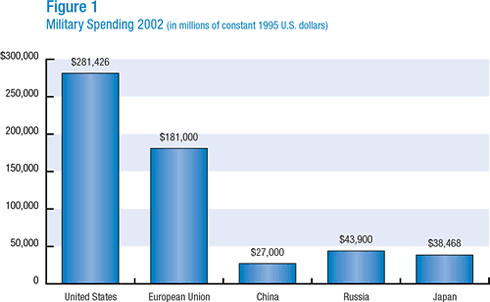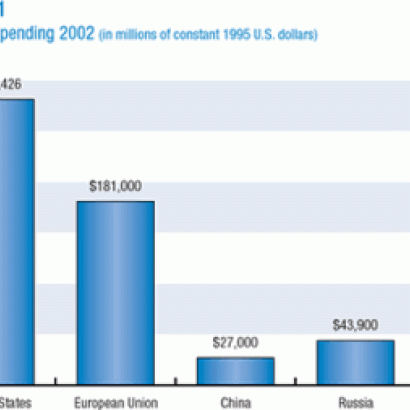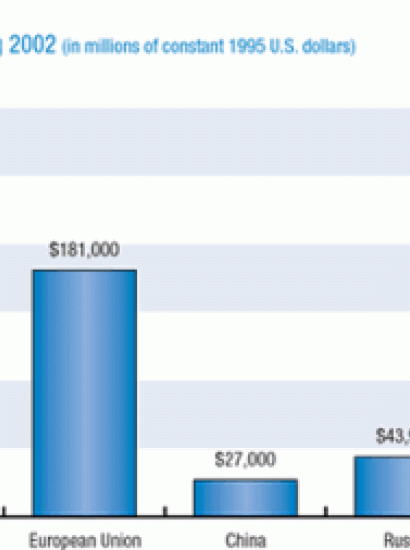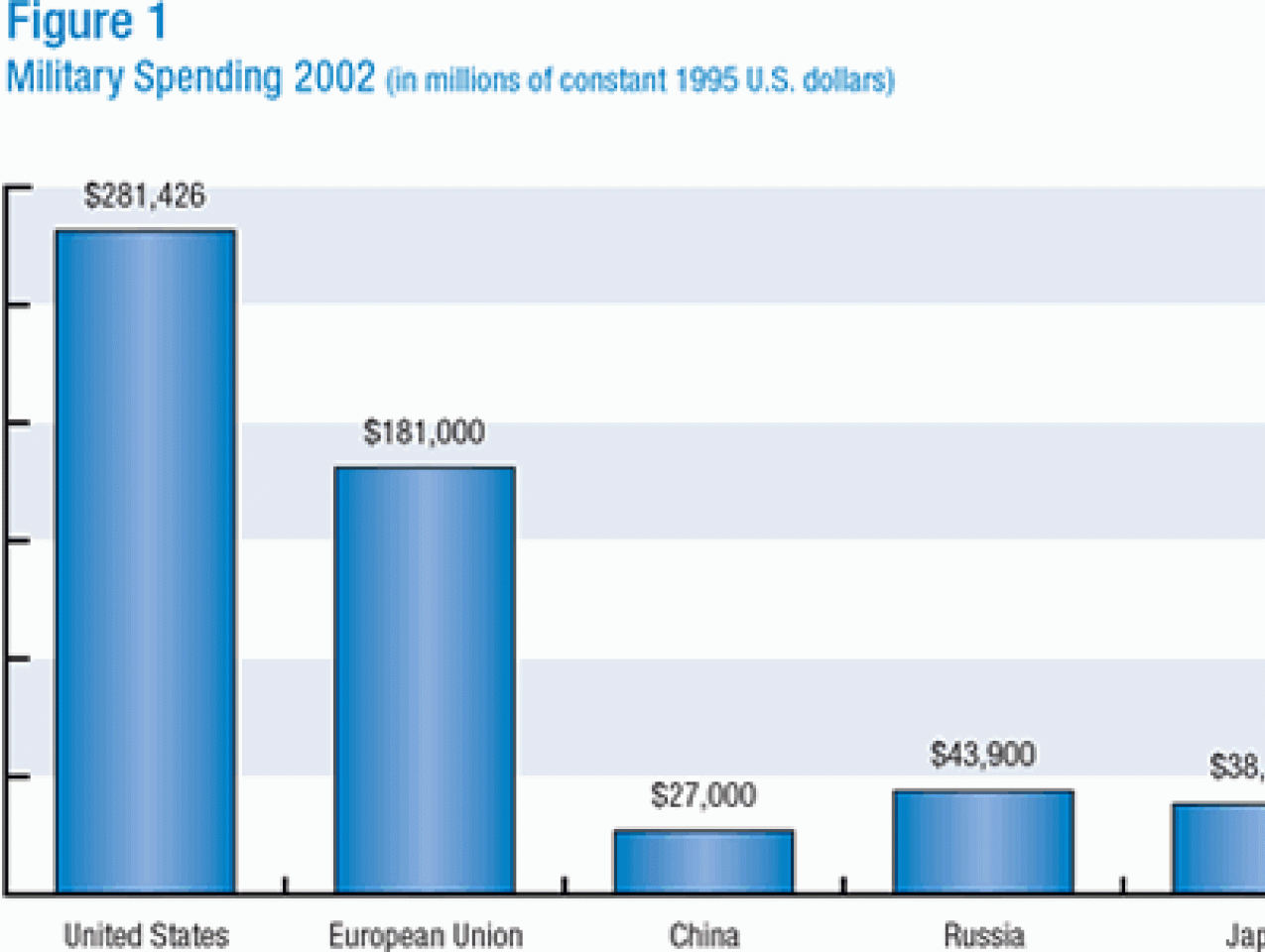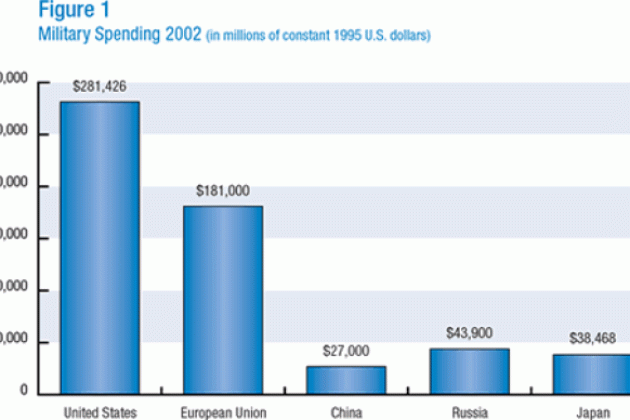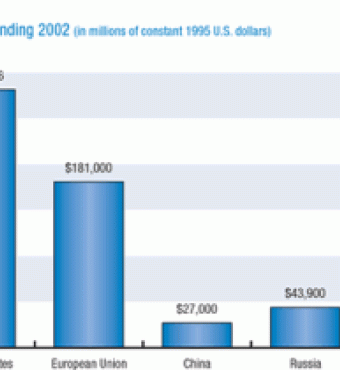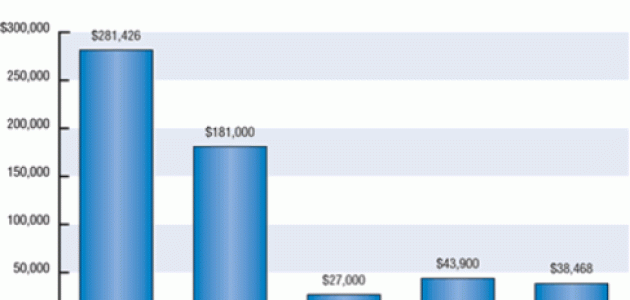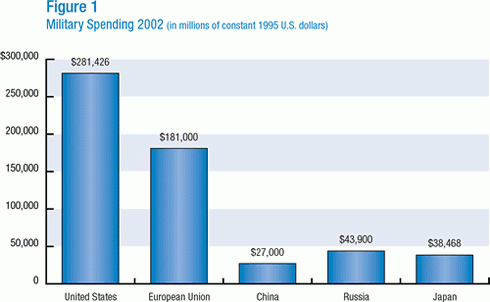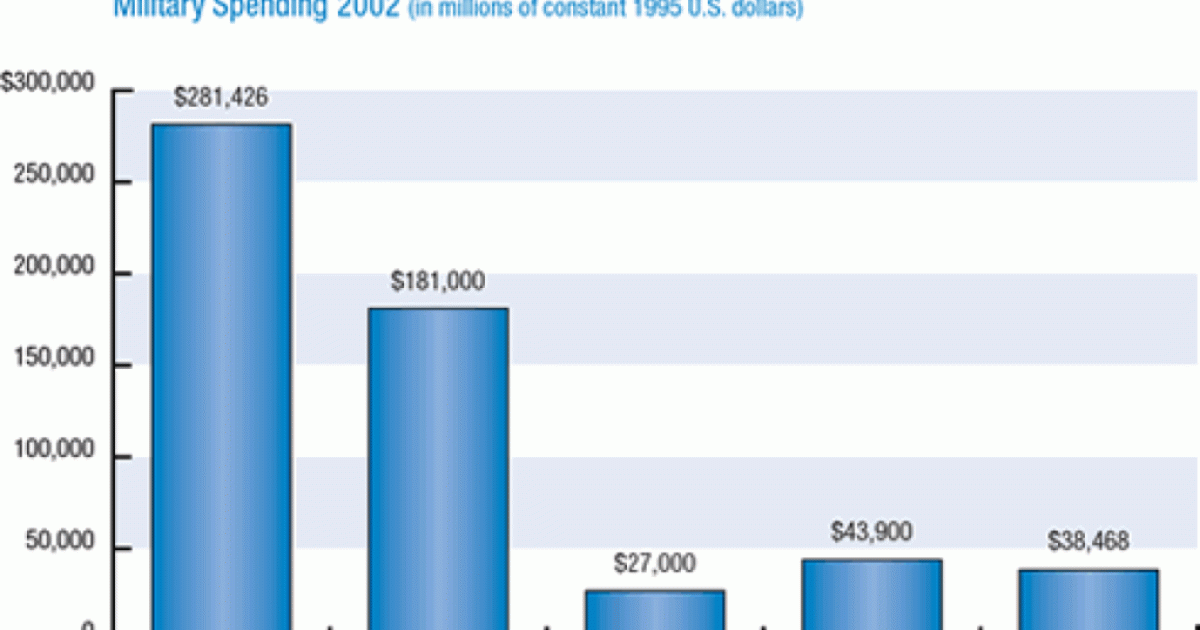- Security & Defense
- US Defense
- International Affairs
- US Foreign Policy
What is power?” asked Tolstoy at the end of War and Peace. Today most people would give a simple answer: Power is America. The United States is the global hegemon. In military terms, there’s never been a superpower like it.
Indeed, forget the word superpower: The United States is now what the former French foreign minister Hubert Védrine recently called a hyperpuissance. Consider the sheer size of the U.S. defense budget. Yale’s Paul Kennedy used to worry about American overstretch. No longer: “The Pentagon’s budget is equal to the combined military budgets of the next 12 or 15 nations,” he wrote in a recent article in the Financial Times. “In other words, the United States accounts for 40–45 percent of all the defense spending of the world’s 189 states.” The European Union (EU) member states collectively spend around $170 billion annually on defense, but the United States spends more than $300 billion per year and could comfortably increase that figure by 60 percent without exceeding 5 percent of gross national product—once seen by Kennedy as the threshold of “overstretch” (see figure 1) Can the United States handle the rest of the world without much help from Europe?” Robert Kagan recently asked. “The answer is that it already does.”

The financial statistics actually understate the huge extent of America’s military lead. The most compelling evidence was there for all television viewers to behold in Kosovo in 1999, in Afghanistan in 2002, and in Iraq as I write. In all three cases, the technical superiority of American forces allowed them to annihilate enemy troops, weaponry, and other military “assets” while sustaining minimal casualties.
All this is, of course, based on the assumption that power is simply military power: the capability to use force against others. Max Weber once characterized the modern state as claiming a monopoly on the legitimate use of violence. In the international sphere there can be no such monopoly. But international power can sometimes seem to depend on monopolizing the most sophisticated means of perpetrating violence. The United States today enjoys the kind of technological edge enjoyed (briefly) by a few West European powers in the nineteenth century, when their possession of ironclad steamboats and machine guns put the world at their mercy.
Yet there are two problems. The first is that we underestimate at our peril the speed with which such technological gaps have been closed in the past. Much of the accuracy of U.S. fighters and bombers now depends on the software that assists pilots in their split-second decision making—and has the potential even to replace pilots altogether. Anyone familiar with the civilian software business knows that it is extremely hard to monopolize a software breakthrough for long.
Secondly, what has made the American “revolution in military affairs” possible has been the extraordinary economic growth of the 1990s, which made very substantial defense expenditures suddenly seem insignificant in relative terms. And in turn that economic growth could only be harnessed because America’s political institutions have been remarkably successful, at least since the time of the First World War, at convincing voters to pay taxes (or approve government borrowing) to maintain and improve national defense.
So power is not just military power; or rather, military power depends on economic growth and political institutions.
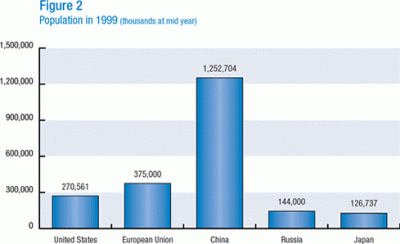
Another line of argument is that power is diplomatic, not military: Precisely the threat posed to smaller countries by the power of the United States is encouraging them to combine against America.
This is an argument that has a special appeal to Europeans. They know that the EU is a military pygmy. (True, Europe’s NATO members have, between them, more men under arms than the United States, but most of them are ill-equipped and ill-trained conscripts.) However, by acting collectively and through the institutions of the postwar international order—the United Nations, the World Trade Organization, NATO—the Europeans may be able to restrain the United States. Samuel Huntington once argued that European integration was “the single most important move” as the rest of the world responded to American hyperpower and that it would ultimately lead to a “truly multipolar” twenty-first century. The fact that the United States spent weeks vainly trying to persuade France and Germany to back military action against Iraq suggests that there is at least some truth in this view.
Certainly, any student of the nineteenth-century balance of power will know that being able to form alliances can more than compensate for a power’s relative weakness. No one wrote better about the way that system worked than A.J.P. Taylor, whose Struggle for Mastery in Europe remains the classic study of diplomatic power. For it was as much shrewd diplomacy as military superiority that led Piedmont and Prussia to triumph over their superficially stronger continental rivals, Austria and France.
There is a nice irony here. Devotees of balance-of-power diplomacy tend to be dismissive of institutions like the United Nations and its predecessor, the League of Nations, established at the instigation of the arch-idealists Woodrow Wilson and Franklin D. Roosevelt. But now those very supranational institutions, erected in the name of collective security—are being used in the most realpolitisch way imaginable by the West European powers.
Nevertheless, diplomacy will only get Europe so far. For demographically, it could be argued, power is inexorably ebbing away from countries with a low birthrate.
It is, of course, the oldest simplification of them all to equate power and population. Still, it clearly matters. With a population of just 286,000, Iceland will never wield power in any meaningful sense; whereas, having a population more than four times larger than that of the United States undoubtedly makes China powerful. The EU also has a substantially larger population than the United States: 375 million to America’s 270 million. But the combination of a low birthrate and restricted immigration means that Europe’s population will probably level off in the next 20 years, whereas the Chinese population has been growing substantially faster than America’s in the past 30 years. America’s erstwhile rival superpower, Russia, is currently in the grip of population decline: There are 5 million fewer Russians than there were 10 years ago, a symptom of the postcommunist economic, social, and environmental malaise.
Population counts: Once again, you only need to ask the French, whose decline and fall as a great power was linked to their relatively low birthrate in the nineteenth century. (In the eighteenth century, they had outnumbered all the other European powers bar Russia.) It’s also worth noting that average population growth rates in the Islamic world have been running at nearly double the Chinese rate. If we are, as Samuel Huntington has claimed, witnessing a clash of civilizations, it must matter that their civilization is quite literally growing faster than ours. It is also a much more youthful civilization than that of the senescent West.
Plainly, however, demography isn’t everything. If it were, India would be the world’s number-two superpower after China. Much more important, economic power is what counts, and by that measure China is barely half as powerful as the United States.
It’s certainly tempting to assume that power is synonymous with gross domestic product: Big GDP equals big power. Hence many analysts point to China’s huge economy and rapid growth as evidence that the country will soon gain superpower rank, if it hasn’t already. Just project forward the average annual growth rates of the past 30 years, and Chinese GDP will equal that of the United States and exceed that of the EU, within just two decades (see figure 3).
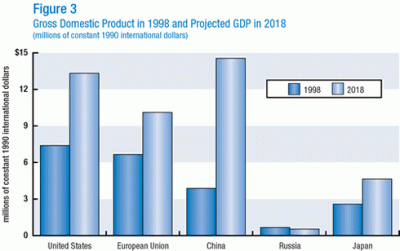
But GDP doesn’t stand for Great Diplomatic Power. If the institutions aren’t in place to translate economic output into military hardware—and if the economy grows faster than public interest in foreign affairs—then product is nothing more than potential power. America overtook Britain in terms of GDP in the 1870s, but it was not until the First World War that it overtook Britain as a global power.
In any case, national growth rates in the next 20 years are unlikely to match those in the past three decades. Depressed Japan’s will almost certainly be lower, while growth in the United States might conceivably be higher, if there is any truth to the claim that U.S. productivity was permanently increased by the investments in information technology during the 1990s. And China will have trouble sustaining average annual growth rates of more than 5 percent in the coming decades. Already the Asian behemoth is suffering some serious social growing pains as market forces rend asunder what was once a command economy. Before 1914, Russia had the fastest growing economy in Europe. But the ensuing social polarization was the main reason Russia collapsed in 1917.
Then again, economic growth is only possible with plentiful cheap oil. According to one commonly held view, it’s oil reserves that really matter. So real power must lie with the Arabs.
The realities here are stark. The Middle East accounts for 31 percent of world oil production but just 6 percent of consumption. North America accounts for about 18 percent of world oil production but consumes 30 percent. Even more sobering, however, are the figures for world oil reserves: America has just 6 percent of them; the Middle East, 65 percent. Right now, the United States depends on the Persian Gulf—mainly Saudi Arabia—for about 14 percent of its oil consumption, or a quarter of its oil imports, but those figures are bound to rise. Some experts predict that from 2008 supplies of non-OPEC oil will fall steeply and that, barring some major technological breakthroughs, there will be an effective world shortage from 2010.
But having oil doesn’t necessarily make you powerful—though it certainly can make you rich. Precisely the strategic importance of Middle Eastern oil makes it a safe bet that the United States will seek to increase rather than diminish its influence in the region in the coming years. Not only Iraq but even Saudi Arabia itself—already a worryingly unstable ally and the breeding ground of the Al Qaeda terrorist network—may have to become de facto American protectorates in the foreseeable future, just as Germany and Japan did after World War Two.
There is another possibility: financial power. According to this view, real power lies with the financiers—the International Monetary Fund and the World Bank—not the commodity producers.
Sub-Marxist teenage demonstrators from Seattle to Prague like to claim that power in fact lies with international financial institutions. This really is as silly as it gets. The two banks like to criticize one another, but both the IMF and the World Bank have one thing in common: They are trying to help less-developed or transitional economies. Their medicine may not always be palatable or effective, but that’s another matter. If these institutions have a problem, it is that they are not powerful enough, not that they are too powerful. Much of the time all they can do is lend money to flaky governments and exhort them to be less flaky. Some power. Their resources are also far more limited than the antiglobalization rent-a-mob seems to realize. What the IMF calls its “total resources” amount to approximately $290 billion, but its net lending capacity is just $88 billion. That’s less than a quarter of the U.S. Social Security budget.
But what if the IMF et al. are just public-sector fronts for the real powerhouses: the multinational corporations (MNCs)? This is a more serious line of argument. Take the three largest companies in the world (according to Fortune magazine): Between them, they have assets worth $550 billion and revenues of a similar order. They employ more than 1.8 million people. Yet it would be a bold claim to say that Wal-Mart stores—the biggest of the three—had power. And even if it seems more plausible to attribute power to the next biggest corporation—Exxon Mobil—the case shouldn’t be overstated.
There have been examples in history of companies exercising power so directly and successfully that they have themselves become states: The East India Company is the most famous. No multinational corporation today comes close to wielding the power that company did when it ruled most of the Indian subcontinent, paying for one of the largest armies in the world—and one of the largest corporate debts—by relentlessly annexing new territories and taxing their inhabitants.
Today’s multinationals exercise power indirectly. Other than in those regions of the world where state power has crumbled away or become hopelessly contested, they prefer to coexist with rather than replace governments. There is a good reason for this. From Russia in 1917 to Iran in 1979, the twentieth century repeatedly demonstrated that even the biggest oil company can be summarily expropriated by a revolutionary regime. That is not to say that multinational companies have not been known to topple or buy governments. But in general the large and immobile assets of most multinational corporations make them as vulnerable as their vast resources make them strong. Nor should it be forgotten that the multinational corporations are owned by multitudes of shareholders. Powerful though their CEOs may be, their power can swiftly be removed if they fail to deliver positive returns to investors.
But the real point, some would claim, is that so many of these multi-national corporations are American. And the products they sell are the key to the real power the United States wields—its “soft” power, the things that make the United States attractive.
The trouble with soft power is that it’s, well, soft. All over the Islamic world there are kids who enjoy (or would like to enjoy) bottles of Coke, Big Macs, CDs by Britney Spears, and DVDs starring Tom Cruise. Do any of these things make them love America more? Strangely not.
Actually, this is not so strange. In the nineteenth century, Great Britain pioneered the use of soft power, though it projected its culture through the sermons of missionaries and the commentaries in Anglophone newspapers. The British also revolutionized world sports, making cricket the most popular sport in the Indian subcontinent, rugby the favorite sport of the Antipodes, and soccer the near-universal opiate of the modern masses. (Only the United States resisted these most virulent strains of British soft power.)
Yet it was precisely from the most Anglicized parts of the indigenous populations of the British Empire that the nationalist movements sprang. The archetype was the Bengali babu—better able to quote Shakespeare than the average expatriate Brit—who worked for the British by day but plotted their overthrow by night. Stone-throwing Palestinians in Nike trainers are today’s version of the same Janus-faced phenomenon.
So what about the trendy claim that power is in the hands of the individual, thanks to the Internet, because information is power—and now vast quantities of information are available to everyone at the click of a mouse?
Here too we need to be skeptical. The American consumer may be the motor of the world economy, but (s)he has a very qualified kind of power—the power of the herd, capable of being either an immoveable mass or a stampeding horde. The trouble with consumer power is that its numerical strength tends to be in inverse proportion to the degree to which it is organized and led. It has become a cliché that nongovernmental organizations are now powerful international actors in their own right, the pillars of a nascent global civil society. The figures are doubtless impressive: Membership of the Worldwide Fund for Nature has increased tenfold since the mid-1980s to around 5 million, while Greenpeace has 2.5 million members. These nongovernmental organizations have considerably more resources than most international governmental organizations: The World Trade Organization’s annual budget is $67 million, less than a quarter of the Worldwide Fund for Nature’s.
But the WWF’s current campaign to stop overfishing of the world’s oceans is likely to be frustrated by the countless millions of—you guessed it—individual consumers who just like eating fish more than they like thinking about the future of the planet. The biggest check on the power of those who actively surf may be the indifference of those who passively shop.
Of course, information isn’t the same as knowledge and it certainly isn’t the same as understanding. Maybe brainpower is the only power (without smart academics, after all, there would be no Internet). On that basis the United States really is numero uno: just count the Nobel Prizes—since 1969 U.S. institutions have won 158, compared with Europe’s meager 85.
The problem with knowledge, however, is that those who are best equipped to acquire it—the egghead professors—are generally very reluctant to monopolize it. They know how hard their own learning would have been if the price of access to older knowledge had been too high. Even if academics have become more hard-nosed since the days of Einstein, those who would like to keep their discoveries secret face the problem that, in an age of the rational application of resources to scientific research, someone else will sooner or later independently make the same breakthrough.
This is why Soviet scientists were all but chained to their laboratories during the Cold War and why intellectual property rights are such a hot topic nowadays. Establishing proprietorship over a brilliant idea can make sharing the idea very profitable. But even then the monopoly tends to be self-liquidating. For the economic incentive must be to make the idea available to as many people as possible, albeit at the highest price they will pay.
One depressing possibility is that these days the real power is in the hands not of eggheads but of maniacs, thanks to the astonishingly easy availability of the means of destruction. There is no doubt that the historic cheapness, smallness, and destructiveness of modern weaponry greatly enhances the power of terrorists. In the face of this kind of power, even the American hyperpower can seem impotent. That, for many commentators, was the lesson of September 11: that the suicide bomber will always get through.
The question remains whether blowing oneself and others up is an effective way of achieving a political objective. Killing British civilians has not (yet) secured a united Ireland for the IRA. And somehow it is hard to imagine the United States meekly withdrawing its military personnel from the Middle East in response to a sustained campaign of terror—if that is indeed what Osama bin Laden wants to achieve.
But what inspires the terrorists? The answer is in large part religious zealotry. Stalin once famously asked how many divisions the pope had. None, it’s true. But we should never underestimate the power of ideology and religion—which certainly has proved more enduring than the power of the Red Army. Indeed, there are those who would say that, after Mikhail Gorbachev and Ronald Reagan, no one did more to bring down communism in Eastern Europe than John Paul II. Faith, then, is perhaps as important a component of power as material resources.
I have tried to suggest that power is about monopolizing as far as possible what might be called the means of projection (of power). A list of these would have to include manpower, weaponry, and wealth but also knowledge and, since a rationally organized bureaucracy is a formidable resource, administrative efficiency.
As we have seen, however, most if not all of these elements of power are tending to become more evenly distributed because of differentials in growth rates and the speed with which knowledge (including knowledge with military applications) can be transmitted. In that sense, power per se is tending to be dispersed. And the more it is dispersed, the less power there is. One power with a nuclear missile is very powerful. Twelve powers with nuclear missiles are each much less powerful than that. The more proliferation, the less power.
The same cannot be said, of course, of natural resources. In the case of oil and other key strategic commodities, these essential elements of power are finite and geographically concentrated. But either way, the inference to be drawn is that we should not exaggerate the likely duration of America’s era as a hyperpower.
Yet there is a final dimension of power that cannot be left out: the psychological. Two things can greatly magnify or diminish the ability of any entity, governmental or nongovernmental, to project power: first, its own legitimacy in the eyes of its individual members; second, its credibility in the eyes of other powers.
These are the unquantifiable—but perhaps the most important—elements of power. And we do well to remember them. For in the war against terrorism declared by President Bush in September 2001, they may prove to be the deciding elements.
As things stand, both parties—the United States and the terrorist diaspora—have firmly established their credibility, the latter by destroying the World Trade Center, the former by overthrowing the Taliban regime and now Saddam Hussein. At the same time, both appear to have legitimacy in the eyes of their respective constituencies. Certainly, the American public mood was dramatically changed by September 11. Certainly, support for Al Qaeda among young Muslims seems to remain strong from Karachi to Riyad. American patriotism is arguably a civil religion as formidable in its way as Islamic fundamentalism.
But is it?
Stamina—the ability of any human organization to sustain a collective effort—is dependent as much on moral as on material factors: That is one of the oldest lessons of military history. The Russian army collapsed in 1917 under far less severe conditions than the Russian army endured in 1942. That was because Stalin’s totalitarian combination of propaganda and coercion preserved his regime’s legitimacy.
There is no reason in theory why democracies should not prove equally resilient, even though they rely on consent through representation rather than (or at least more than) on coercion. But we don’t know for sure. No democracy has ever suffered privations as colossal as those the Nazis inflicted on the Soviets; the United States in particular has got off amazingly lightly in all the wars it has fought against external enemies.
Power, then, is partly about material things: guns, butter, men, money, oil. But it is also about morale. In a world characterized by the diffusion of most of the material elements of power, real power may therefore come to depend on having credibility and legitimacy. Faith cannot move mountains. But it can move men.







